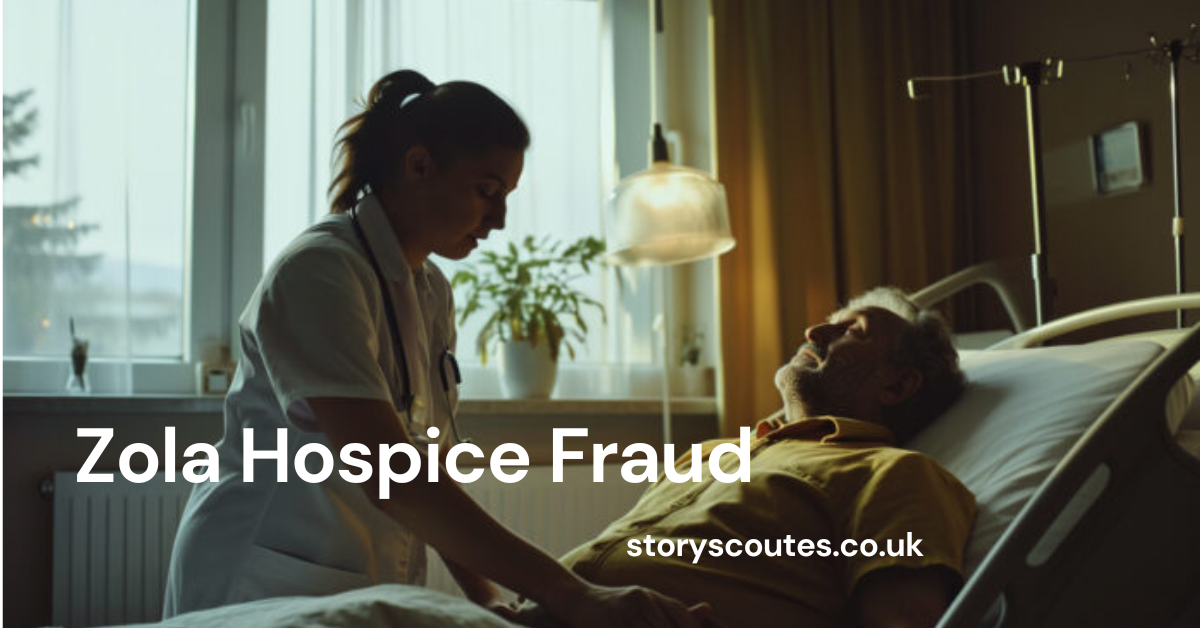Zola Hospice Fraud – A Deep Dive into One of the Most Notorious Healthcare Scandals
The healthcare industry is built on trust, compassion, and a commitment to improving lives. However, when that trust is violated, it can have devastating effects on patients, families, and the healthcare system itself. The “Zola Hospice Fraud” case is a stark reminder of how financial irregularities and unethical practices can tarnish the reputation of healthcare providers and jeopardize the wellbeing of those they are meant to serve.
In this article, we will explore the Zola Hospice Fraud case in detail, examining how it unfolded, the consequences it had on the healthcare industry, and what it teaches us about the importance of ethical practices in healthcare. We’ll also provide insights and analysis that go beyond the surface-level information available online, aiming to offer a comprehensive understanding of this complex issue.
What is the Zola Hospice Fraud?
The Zola Hospice Fraud case revolves around a series of criminal activities, including fraud, conspiracy, and making false statements, carried out by Zola Hospice and its officials. These illegal actions were primarily aimed at financial gain, with little regard for the patients who relied on hospice care during some of the most vulnerable moments of their lives.
Hospice care is designed to provide comfort and support to patients with terminal illnesses, focusing on quality of life rather than curative treatments. Unfortunately, in the case of Zola Hospice, the focus shifted from patient care to maximizing profits through fraudulent means.
The Unfolding of the Zola Hospice Fraud
The Zola Hospice Fraud did not occur overnight. It was the result of a calculated scheme that spanned several years. Authorities began investigating Zola Hospice after receiving reports of suspicious activities, including inflated billing practices and the admission of ineligible patients into hospice care.
Inflated Billing Practices
One of the most common forms of fraud in the healthcare industry involves inflated billing practices. In the case of Zola Hospice, officials were accused of submitting false claims to Medicare and other insurance providers. These claims often included services that were either never provided or were exaggerated in scope and cost.
For example, Zola Hospice might have billed Medicare for round-the-clock nursing care for a patient, even if the patient only received minimal care. By inflating the amount of care provided, Zola Hospice was able to receive higher reimbursements from Medicare, effectively defrauding the government and taxpayers.
Admitting Ineligible Patients
Another critical aspect of the Zola Hospice Fraud was the admission of ineligible patients into hospice care. Hospice care is specifically intended for patients who are terminally ill, with a prognosis of six months or less to live. However, Zola Hospice officials were accused of enrolling patients who did not meet these criteria, simply to increase their patient count and, consequently, their revenue.
This practice is particularly troubling because it not only defrauds the healthcare system but also deprives patients of appropriate care. Patients who were not terminally ill but were enrolled in hospice care may have been denied access to curative treatments that could have improved or even saved their lives.
The Legal Consequences
The Zola Hospice Fraud case eventually caught the attention of federal authorities, leading to a thorough investigation and subsequent legal action. Zola Hospice and its officials were charged with multiple offenses, including:
- Fraud: The intentional deception or misrepresentation of services to secure unwarranted financial gain.
- Conspiracy: The agreement between two or more parties to commit illegal acts, such as defrauding Medicare.
- Making False Statements: Providing false information to government agencies, including Medicare, to receive payments for services that were either not rendered or exaggerated.
The legal proceedings against Zola Hospice were complex, involving multiple parties and extensive evidence of wrongdoing. Ultimately, the case resulted in significant penalties for those involved, including fines, restitution payments, and, in some cases, imprisonment.
Impact on the Healthcare Industry
The Zola Hospice Fraud case had far-reaching implications for the healthcare industry, particularly within the hospice care sector. It highlighted the vulnerabilities in the system that allow fraudulent activities to occur and underscored the need for stronger oversight and regulation.
Erosion of Trust
One of the most significant impacts of the Zola Hospice Fraud case was the erosion of trust in the hospice care system. Patients and their families rely on hospice providers to deliver compassionate, high-quality care during some of the most challenging times in their lives. When that trust is broken, it can have devastating effects, leading to fear and skepticism about the entire industry.
The case also damaged the reputation of other hospice providers who operate ethically and strive to provide the best possible care for their patients. The actions of a few bad actors can cast a shadow over the entire industry, making it more difficult for legitimate providers to build and maintain trust with their patients.
Financial Repercussions
The financial repercussions of the Zola Hospice Fraud case were also significant. The fraudulent billing practices carried out by Zola Hospice resulted in millions of dollars in losses for Medicare and other insurance providers. These losses ultimately trickle down to taxpayers, who bear the burden of covering the costs of fraud.
In response to the case, there has been increased scrutiny of billing practices within the hospice care industry, leading to more rigorous audits and oversight. While these measures are necessary to prevent future fraud, they also place additional administrative burdens on legitimate providers, who must ensure that their billing practices are beyond reproach.
Regulatory Changes
The Zola Hospice Fraud case also spurred regulatory changes aimed at preventing similar incidents in the future. Federal and state agencies have implemented stricter guidelines for hospice care providers, including more stringent criteria for patient eligibility and enhanced auditing processes.
These changes are designed to protect patients and ensure that hospice care is provided only to those who genuinely need it. However, they also require hospice providers to invest more time and resources into compliance, which can be challenging for smaller organizations with limited budgets.
Lessons Learned from the Zola Hospice Fraud Case
The Zola Hospice Fraud case serves as a powerful reminder of the importance of ethical practices in healthcare. It highlights the need for vigilance, transparency, and accountability in all aspects of patient care and financial management.
Importance of Ethical Leadership
One of the key lessons from the Zola Hospice Fraud case is the importance of ethical leadership within healthcare organizations. Leaders set the tone for the entire organization, and when they prioritize financial gain over patient care, it can lead to a culture of dishonesty and unethical behavior.
Healthcare leaders must prioritize ethical decision-making and foster a culture of integrity within their organizations. This includes setting clear expectations for employees, providing ongoing training on ethical practices, and holding individuals accountable for their actions.
Need for Strong Oversight
The case also underscores the need for strong oversight and regulation within the healthcare industry. While most healthcare providers operate with integrity, the Zola Hospice Fraud case demonstrates that there are always those who will seek to exploit the system for personal gain.
Federal and state agencies play a critical role in monitoring healthcare providers and ensuring that they adhere to ethical standards. This includes conducting regular audits, investigating reports of suspicious activities, and taking swift action against those who violate the law.
Patient Advocacy
Finally, the Zola Hospice Fraud case highlights the importance of patient advocacy. Patients and their families must be informed and empowered to ask questions and seek clarification about their care. This includes understanding their rights, knowing what services they are entitled to, and being vigilant about any red flags that may indicate fraud or unethical practices.
Healthcare providers also have a responsibility to educate their patients about their rights and to be transparent in all aspects of care. By fostering open communication and trust, providers can help protect their patients from fraud and ensure that they receive the care they deserve.
FAQs
What was the primary crime in the Zola Hospice Fraud case?
The primary crime in the Zola Hospice Fraud case involved submitting false claims to Medicare and other insurance providers, often for services that were never provided or exaggerated, and enrolling ineligible patients into hospice care.
How did the Zola Hospice Fraud affect patients?
Patients were negatively impacted by being enrolled in hospice care when they did not meet the criteria, potentially being denied life-saving treatments, and by the overall erosion of trust in hospice care services.
What were the legal outcomes for Zola Hospice officials?
Zola Hospice officials faced charges including fraud, conspiracy, and making false statements, leading to significant fines, restitution payments, and imprisonment for those involved.
What lessons can be learned from the Zola Hospice Fraud case?
The case teaches the importance of ethical leadership, strong oversight, and patient advocacy in healthcare to prevent fraud and ensure that patient care remains the top priority.
How has the healthcare industry responded to the Zola Hospice Fraud?
The industry has seen increased scrutiny and regulatory changes aimed at preventing similar incidents, including stricter guidelines for patient eligibility and enhanced auditing processes.
How can patients protect themselves from healthcare fraud?
Patients can protect themselves by being informed about their rights, asking questions about their care, and being vigilant for any red flags that may indicate fraud or unethical practices.
What impact did the Zola Hospice Fraud have on Medicare?
The fraud led to significant financial losses for Medicare, as inflated billing practices resulted in millions of dollars in unwarranted payments to Zola Hospice.
Conclusion
The Zola Hospice Fraud case is a sobering example of how financial greed can corrupt the healthcare system and harm patients. It serves as a reminder of the critical importance of ethical practices, transparency, and accountability in healthcare. As the industry continues to evolve, it is essential that healthcare providers, regulators, and patients work together to ensure that care remains patient-centered and that trust in the system is preserved.
By learning from the lessons of the Zola Hospice Fraud case, the healthcare industry can take steps to prevent similar incidents in the future, ensuring that hospice care remains a source of comfort and support for those who need it most.






